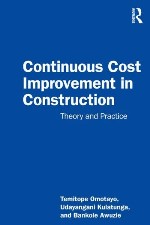BOOK REVIEW
 Book Title: Continuous Cost Improvement in Construction: Theory and Practice
Book Title: Continuous Cost Improvement in Construction: Theory and Practice
Author: Temitope Omotayo, Udayangani Kulatunga and Bankole Awuzie
Publisher: Routledge
List Price: $51.19 paperback & eBook, $160.00 Hardback
Format: Softcover, 288 pages
Publication Date: 2022
ISBN: 978-1-003-17607-7
Reviewer: Walter E. Childs, PMP
Review Date: December 2024
Introduction
The book “Continuous Cost Improvement in Construction: Theory and Practice” should be an essential resource for any project manager in the architecture, engineering, and construction (AEC) industry. It explores cost management practices through the lens of continuous improvement, or Kaizen—a core philosophy of Lean Construction and Six Sigma. Applying continuous cost improvement methodologies is crucial for modernizing construction methods and processes. While the AEC industry typically employs the waterfall methodology in project management, integrating continuous cost improvement throughout the project lifecycle ensures a consistent focus on minimizing both physical and financial waste.
Overview of Book’s Structure
The book offers a well-structured approach, beginning with an overview of Deming’s Cycle of Continuous Improvement, which highlights the foundational Plan-Do-Check-Act (PDCA) principle. It explores the nine core principles of continuous improvement, providing readers with a detailed understanding of value management, cost-influencing factors, and actionable strategies for applying continuous improvement techniques to minimize overhead in construction projects. Furthermore, the book examines the global application of continuous improvement practices, presenting diverse examples of how various countries implement processes for overhead cost reduction. Through real-world case studies and practical examples, it demonstrates the effectiveness of these strategies while equipping readers with robust decision-making tools to support and optimize continuous cost improvement efforts across different contexts within project management.
Highlights
The book highlights several key concepts that are crucial for understanding and applying continuous improvement in construction cost management. These include:
- Deming’s Principle of Continuous Improvement: The foundational Plan-Do-Check-Act (PDCA) framework, which serves as a systematic approach to achieving incremental and sustainable improvements in processes and outcomes.
- The Nine Principles of Continuous Improvement: A detailed exploration of the core principles that underpin the philosophy of continuous improvement, providing actionable insights for enhancing efficiency and reducing waste in construction projects.
- Factors Influencing Construction Estimation: An in-depth analysis of the variables affecting cost estimation in construction, from material prices and labor rates to project scope and environmental considerations, enabling more accurate and realistic budgeting.
- Kaizen Costing: The application of Kaizen principles to cost management, emphasizing continuous small improvements to achieve significant cost savings over time.
- Construction Cost Management Techniques: A comprehensive review of traditional and innovative methods for managing costs throughout the project lifecycle, including tools and frameworks to mitigate cost overruns and improve financial control.
- Modern Methods of Cost Control: An examination of advanced techniques and technologies, such as Building Information Modeling (BIM) and Lean Construction, that are transforming cost control in the construction industry by enhancing precision and efficiency.
More…
To read entire Book Review, click here
How to cite this work: Childs, W. E. (2025). Continuous Cost Improvement in Construction: Theory and Practice, book review, PM World Journal, Vol. XIV, Issue I, January. Available online at https://pmworldlibrary.net/wp-content/uploads/2025/01/pmwj148-Jan2024-Childs-Continous-cost-Improvement-in-construction-book-review.pdf
About the Reviewer

Walter E. Childs
Grand Prairie, Texas, USA
![]()
Walter Childs, M.Ed., PMP, PSM is a retired U.S. Army veteran with 21 years of distinguished service, including roles as Acting Operations Sergeant Major and Operations Officer. His military expertise encompasses managing Emergency Operations Centers, coordinating operational plans, and advising on civil-military relations. Walter also served as an EEO Officer and Emergency Operations Center Officer. Notably, he was the Non-Commissioned Operations Officer in Charge for the Kosovo Base Camp Construction Agency, where he played a key role in creating Camps Bondsteel and Montieth. After retiring from the military, Walter served as the Construction Inspection Manager for the City of San Antonio Public Works while simultaneously pursuing higher education. He earned a Bachelor’s degree from the University of the Incarnate Word and a Master’s degree from Houston Christian University. Walter further contributed to education as an Assistant Principal and National Championship Basketball Coach. With extensive experience in civil engineering management, Walter excels in overseeing design projects, leading cross-functional teams, and implementing strategic initiatives to enhance operational efficiency. He can contacted via https://www.linkedin.com/in/wechilds/
Editor’s note: This book review was the result of a partnership between the PM World Journal and the PMI Dallas Chapter. Authors and publishers provide books to the PM World Journal Editor; books are delivered to the PMI Dallas Chapter where they are offered free to PMI members who agree to provide a review within 45 days; book reviews are published in the PM World Journal and PM World Library. Reviewers can normally claim PDU’s for PMP recertification (or continuing education credits for other certifications) upon publication of their book reviews.
If you would like us to publish a book review or are an author or publisher of a project management-related book, and would like the book reviewed through this program, please contact editor@pmworldjournal.com.









